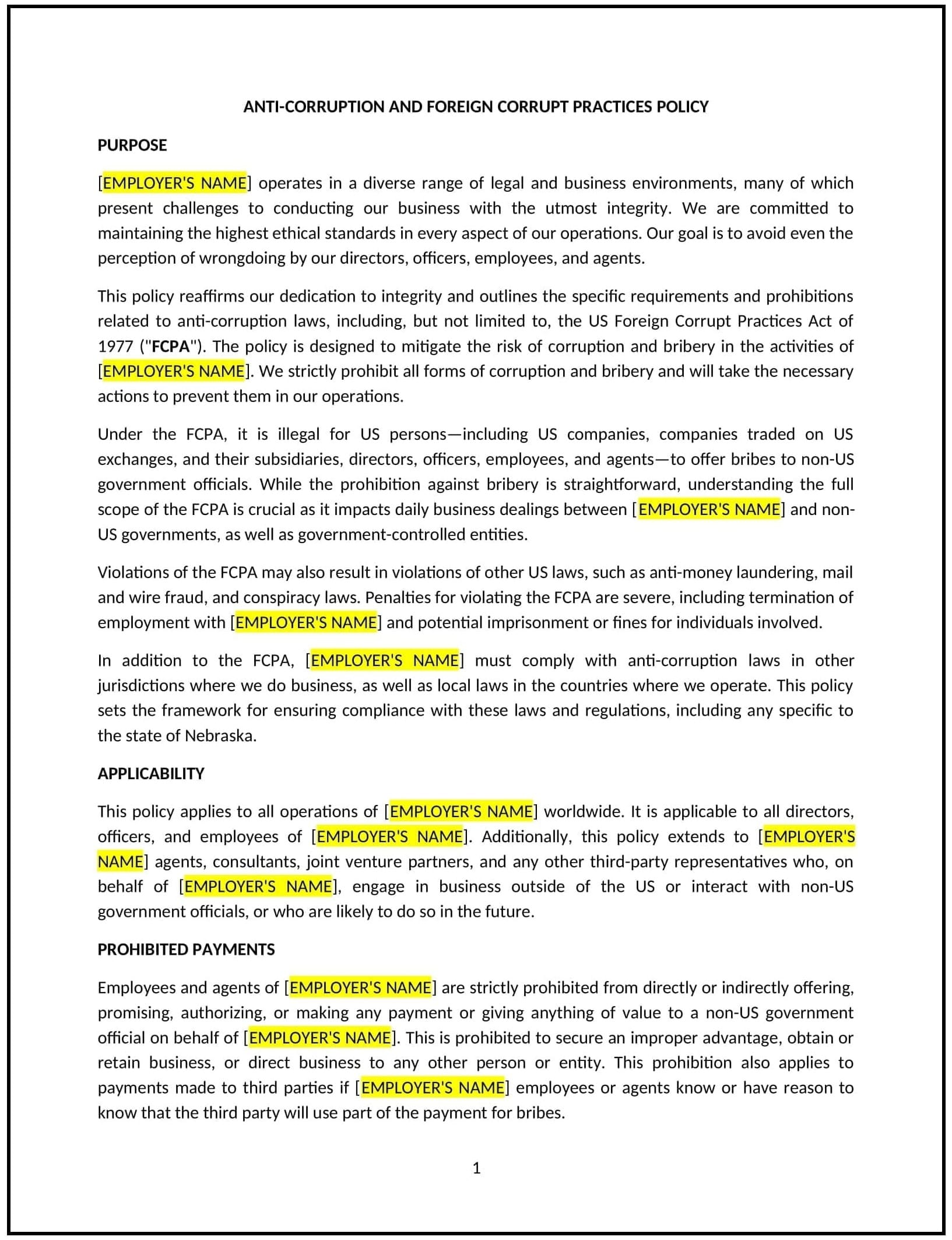Anti-corruption and foreign corrupt practices policy (Nebraska): Free template
Got contracts to review? While you're here for policies, let Cobrief make contract review effortless—start your free review now.

Customize this template for free
Anti-corruption and foreign corrupt practices policy (Nebraska)
An anti-corruption and foreign corrupt practices policy helps Nebraska businesses prevent and address bribery, corruption, and unethical conduct related to business operations both domestically and internationally. This policy outlines the behaviors that are prohibited, including offering or accepting bribes or kickbacks, and establishes procedures for reporting suspicious activities. It is designed to promote ethical business practices, protect the reputation of the company, and mitigate the risk of legal and financial penalties.
By adopting this policy, businesses in Nebraska can foster a culture of integrity, promote transparency in business dealings, and ensure adherence to state and international anti-corruption laws.
How to use this anti-corruption and foreign corrupt practices policy (Nebraska)
- Define corruption and unethical practices: Clearly outline what constitutes corruption, bribery, and unethical conduct in business operations, including offering or accepting kickbacks, bribes, or other improper payments.
- Set prohibitions: Specify that employees, contractors, and business partners must not engage in or support corrupt practices, including making or receiving payments to influence business decisions, both domestically and internationally.
- Establish reporting mechanisms: Create a clear, anonymous process for employees to report suspected corruption, bribery, or violations of the policy without fear of retaliation.
- Provide training and education: Offer regular training to employees on recognizing corrupt practices, understanding the risks involved, and adhering to the policy. Ensure that employees understand the legal implications of corruption and bribery.
- Conduct due diligence on business partners: Implement procedures for vetting third-party partners, vendors, or contractors to ensure they align with the company’s ethical standards and are not involved in corrupt activities.
- Monitor and enforce the policy: Regularly monitor business activities for potential violations, and establish a process for investigating and taking corrective action in response to any suspected violations of the policy.
- Review and update: Periodically review the policy to ensure it remains relevant and aligned with Nebraska law, federal regulations, or international anti-corruption standards.
Benefits of using this anti-corruption and foreign corrupt practices policy (Nebraska)
This policy provides several benefits for Nebraska businesses:
- Promotes ethical business practices: Clear guidelines and prohibitions help create a culture of integrity, where all employees and partners are expected to operate with honesty and fairness.
- Reduces legal risks: By establishing clear procedures for searches and respecting employee privacy, businesses can reduce the risk of legal claims related to unlawful searches or violations of employee rights.
- Protects company reputation: Businesses that commit to ethical practices and actively prevent corruption build trust with customers, investors, and stakeholders, strengthening their brand and reputation.
- Encourages transparency: By setting expectations and providing mechanisms for reporting misconduct, businesses can foster transparency and openness in all business dealings.
- Ensures fair competition: A policy against corruption helps maintain a level playing field for all business activities, ensuring that decisions are made based on merit and legal criteria rather than bribes or unethical influence.
Tips for using this anti-corruption and foreign corrupt practices policy (Nebraska)
- Communicate the policy clearly: Ensure all employees, contractors, and partners understand the policy and their role in maintaining ethical practices, both locally and internationally.
- Provide regular training: Offer annual or bi-annual training on anti-corruption laws, ethical decision-making, and the potential consequences of engaging in corrupt activities.
- Foster a zero-tolerance culture: Emphasize that corruption and bribery will not be tolerated under any circumstances and that violators will face serious consequences, including termination or legal action.
- Implement due diligence procedures: Vet all third-party partners, vendors, and contractors to ensure they adhere to the company’s anti-corruption standards before entering into business relationships.
- Monitor business activities: Regularly audit business operations, especially in foreign markets, to ensure compliance with anti-corruption laws and detect any potential violations.
- Review the policy periodically: Ensure the policy is updated regularly to align with changes in laws, regulations, and business operations, especially as international business practices evolve.